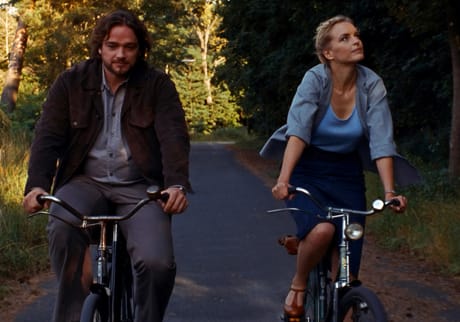Set in the midst of Cold War-era East Germany, Christian Petzold's decidedly counter-symbolic character drama, Barbara, focuses on provincial regions of the time with lessened military presence, making the threat more of an ominous concept than a physical reality.
This notion is inherent in the setup, with the titular Barbara (Nina Hoss) being assigned work at a rural hospital, banished from Berlin after submitting an application to the West for transfer.
Cold and misanthropic, Barbara is scrutinized and criticized by her new peers, who read her distance as superiority, having come from an esteemed hospital in the city. But, as her new co-worker Andre (Ronald Zehrfeld) quickly observes, such things aren't quite so easily defined. Barbara demonstrates a natural ease with her patients and takes her work very seriously, suggesting her standoffishness is more of a learned mode of self-preservation than an act of defiance and self-righteousness.
The central plot is quite straightforward, with our highly talented protagonist slowly smuggling her life savings out of East Germany with a lover from the West, intending to escape at a future time. But as she develops her plan, carefully hiding any evidence from the Stasi officers that routinely search her house and body, she begins to learn about Andre's secrets and develops a bond with him about shared interests and common plights.
What Petzold has done is craft a subtle character piece about the nature of bonding and connection in an environment where trust is impossible. The careful way Barbara and Andre probe each other to establish loyalties and priorities is specific to the environment and time, heightening their connection with the element of danger. It adds an aspect of tension to a story that otherwise has very little action.
The mere acts of conversation and trust are thrilling in themselves, which is a testament to how sharply observant Petzold is about human dynamics.
(Films We Like)This notion is inherent in the setup, with the titular Barbara (Nina Hoss) being assigned work at a rural hospital, banished from Berlin after submitting an application to the West for transfer.
Cold and misanthropic, Barbara is scrutinized and criticized by her new peers, who read her distance as superiority, having come from an esteemed hospital in the city. But, as her new co-worker Andre (Ronald Zehrfeld) quickly observes, such things aren't quite so easily defined. Barbara demonstrates a natural ease with her patients and takes her work very seriously, suggesting her standoffishness is more of a learned mode of self-preservation than an act of defiance and self-righteousness.
The central plot is quite straightforward, with our highly talented protagonist slowly smuggling her life savings out of East Germany with a lover from the West, intending to escape at a future time. But as she develops her plan, carefully hiding any evidence from the Stasi officers that routinely search her house and body, she begins to learn about Andre's secrets and develops a bond with him about shared interests and common plights.
What Petzold has done is craft a subtle character piece about the nature of bonding and connection in an environment where trust is impossible. The careful way Barbara and Andre probe each other to establish loyalties and priorities is specific to the environment and time, heightening their connection with the element of danger. It adds an aspect of tension to a story that otherwise has very little action.
The mere acts of conversation and trust are thrilling in themselves, which is a testament to how sharply observant Petzold is about human dynamics.
